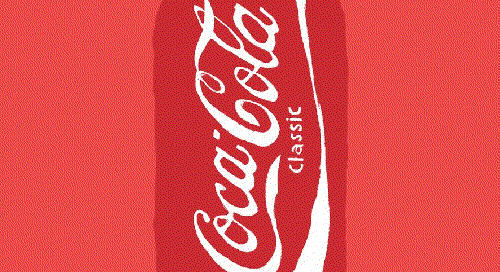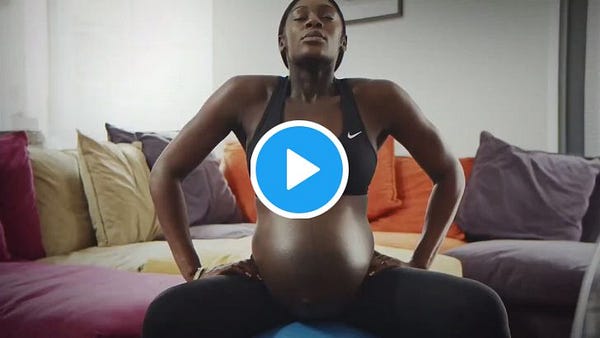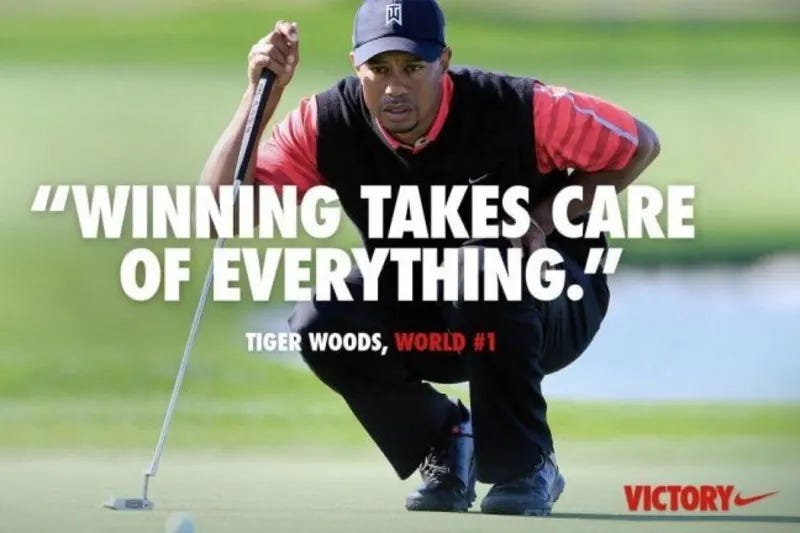Second guessing Facebook's sport strategy; Ricardo Fort's milky spoon; Giles Morgan makes me believe in God; the view from the WhatsUP Group; Carina White's ambition and much more
The newsletter of the podcast
PLEASE make sure your spam filters recognise Unofficial Partner as a friend. Check your Promotions tab or spam folder and mark our email address as “not spam” or add it to your contact list.
Tl;dr
Facebook’s next phase
The news analogy
Targeting the Big Middle of the sports rights market
Nike and pregnancy, a reminder
Coke, the Olympics and spoons
Giles Morgan makes me believe in God
The view from the WhatsUP Group
Personal Best - Carina White, Tongue Tied Media
UP Coming: The Bundle
5 things to remember when discussing Facebook and sport
When it comes to Facebook, Peter Hutton is the face and voice of sport. And he’s really good at it - hear the conversation UP Pod #148.
Peter has to look both ways: to interpret Facebook to the sport industry and vice versa. The first bit leads very quickly to the ‘will they/won’t they’ question re media rights.
The answer to that one is a fat no: They ain’t coming with a big cheque.
So instead, let’s focus on the other part of Peter’s job, which is often overlooked and I’ve come to think is more interesting. In particular, how is Facebook Inc going to evolve and how does this shape their view of sport?
They’re watching your lips move but really, they’re thinking about products
Facebook was founded and is run by engineers. They make products. That’s what they wake up thinking about.
In every public conversation over the past two years, Peter Hutton’s answers have been peppered with product references, imploring sports rights holders to find new ways to use the portfolio, from Occulus and Instagram Stories to Messenger, Facebook Groups and WhatsApp.
Casey Newton’s excellent Platformer newsletter suggests there’s a move to redefine Facebook’s commercial model beyond the News Feed, aka the most lucrative advertising product ever built.
This means payment products are taking up a lot of engineering time.
Casey Newton: On the commerce side, Instagram is spinning up a standalone shopping app. On the payments front, David Marcus’ team is developing a cryptocurrency. In his blog post, Zuckerberg says a more private suite of Facebook services will give rise to “businesses, payments, commerce, and ultimately a platform for many other kinds of private services.”
Now listen to Peter Hutton and you hear the top line strategy being applied to sport. Note the selling of the payment opportunities, and the kicker in the last line:
You look at the value of that lead generation and Major League Baseball. We had some MLB live on the platform for a while, and they generated half a million dollars of ticket sales by retargeting...look at the Ironman business model, getting people to sign up for the events…the monetization tools on Facebook are clearly improving all the time. You look at numbers the UFC are generating, in the millions of dollars a year, through Facebook videos and ad insertion in those videos, you look at World Surf League, where we used to pay for content. We don't pay for that content now, but they're generating great returns because they're integrating their sponsors into the broadcast. So they see it as branded content. And then you look at things like paid online events where you can now sort of create this pay-per-view type products on Facebook. So I still think we've got some really strong arguments about why you should go there.
It's just important to dissociate that from the big guaranteed cheque the sports industry is used to.
The timing doesn’t work
Media rights is a slow business. The NFL is selling seven year licenses. The Premier League is selling three years.
By comparison, Facebook outlooks six months (see quote below).
Remember, this is the company whose founder first came up with the phrase, ‘Move fast, break things’.
These two world views just don’t coalesce. It means that Facebook’s decision makers see the multi-year commitment of sports rights as a prison sentence. They don’t get it, never have, never will.
Peter Hutton: Look at how Facebook works, and its priorities; it's done on a six month to six month basis. The engineering teams get told, “This is your target for the next six months”. And we (FB Sport) follow those product teams’ leads. We have to be clear, that's the way the company works.
The majority of people that are hired are always going to be engineers. Therefore we need to fit in with their project life cycles.
It’s always worth keeping an eye on the news
Facebook’s News Feed is the money making phenomena of our times.
Casey Newton/Platformer: ‘Along with Google AdWords the most lucrative advertising product ever built. The News Feed is more than just Facebook’s core consumer product — it’s the company’s core business unit’.
Like all other owners of digital content, sport’s rights holders have been encouraged to drive their audience to the News Feed, turning them from fans to Facebook users.
They did/do this because they’ve been convinced this is the route to growth, via the ‘new fan’, the one that appears in the vicinity of sports content rather than actually, you know, caring about it enough to pay for it.
News publishers are analogous with sports rights holders when it comes to their relationship with Facebook. And theirs is not a happy story.
There was an initial rush to distributed news - aka, give expensive journalism to Facebook for free in return for access to ‘new readers’ - which positioned Buzzfeed as the heroes of the news business, right up until they weren’t.
I once appeared at a conference with some Buzzfeed news executives who boasted that 95% of their readers never went to buzzfeed.com. It didn’t matter, went the argument, as long as their brand was engaging with Gen Z on Facebook’s News Feed.
This memory comes back when listening to digital marketers at football clubs, as they rush to give away their content free to TikTok, Snap, Fortnite et al.
Theme parks in the desert: Zuck’s planning for life beyond the News Feed
Trump, fake news, Cambridge Analytica, societal collapse, filter bubbles, the storming of the Capitol, Russian interference…the recent snafu in Australia; these are all bullet points in the regulators’ dossier to curtail Silicon Valley’s power.
And Facebook’s News Feed is their number one target; Zuckerberg’s own 2019 blog post revealed the extent to which he was seeking to diversify income beyond news feed advertising. Spoiler: the future is privacy and shopping.
The future is more private as more users, particularly the richer ones, take steps to go dark, preventing the wholesale data capture that defined the early years.
Seen through this lens, Facebook is like Dubai, building theme parks in the desert for when the oil runs out.
Targeting the Big Middle
Again, using news as a guide, you notice the messages on revenue generation running in parallel to a shift away from relationships with big brand publishers, and toward smaller partnerships with niche groups, influencer/creators and individual journalists.
For the first decade-plus of its existence, Facebook’s media partnerships have largely been with big companies like CNN and News Corp. A more Facebook-like approach to media partnerships would be to start at the level of the individual and help people start building their businesses that way.
So, in sport this would mean pay per view products for smaller event holders, the extension of Facebook Gaming, their Twitch-killer esports play and a focus on helping individual creators and athletes make money.
All this is allied to a move away from big ticket leagues selling premier rights in their own domestic markets. Note, the absence of Facebook from the recent NFL domestic auction in the US.
On rights generally, the only clear rationale for buying them, is as a way of building initial relationships and an opportunity for Facebook to demonstrate its product line while rights holders are on their platform.
Evidence for this statement is FB’s willingness to buy a small number of highly selective rights in different markets with the view to test and learn. Recent events fit this framing. Note how the company dipped in and out of UEFA Champions League and La Liga in Latin America and India, respectively.
Show don’t tell, test and learn, and pick up the data along the way.
Having helped migrate their own audience on to Facebook, the rights holders are then left with an old question: was it worth it?
The role of spoons in Coke’s IOC renewal
From this week’s podcast with Ricardo Fort (UP Pod #149), recently ex-global head of Coca-Cola sport and entertainment.
We talked about Coke’s 12-year IOC TOP renewal, which for the first time since 1928 sees the Atlanta company share the category with another firm, in the shape of Mengniu, the China dairy conglomerate. (Hear our conversation with Timo Lumme of the IOC on UP Pod #112)
Coke’s money is important to the IOC obviously, but so too is its presence on the TOP roster. A theme of the last decade has been a shift in the make-up of the IOCs commercial partners: eastward and towards B2B.
Coke is the ultimate ‘company you keep’ brand partner, as a symbol of America and of the Olympics as a consumer brand platform.
There’s been a rumour that Coke were seeking a route out, and that the Mengniu deal was critical in maintaining the oldest relationship in sports marketing.
But Ricardo Fort played a straight bat, explaining the principle of category creep via the medium of spoons.
If there is no alcohol and you can drink it, chances are Coke has the category.
There are a lot of things in the dairy category that are not drinkable. So if you think about cheese and ice cream, And some forms of yogurts that you eat with spoons. So there's a lot of things that are not beverages. And of course there was no interest for Coca-Cola to own this kind of categories.
See also: Ricardo’s view on the ‘nice but useless’ post-event sponsor recall research.
The view from the WhatsUP Group
Context: Arsene Wenger’s suggestion for two year cycles for the big national tournaments.
"Organise only competitions of meaning," he told beIN Sports.
"Kick all the parallel competitions out of the game. People must understand what is at stake and only have games with meaning.
"If you look at the teams in the World Cups usually the average age is 27 or 28. Because the World Cup is every four years there are very few chances to win it again because when they go back to the next World Cup they are 32 or 33.
"That's why maybe we should organise the World Cup every two years."
Question to the WhatsUP Group: Would this work for women’s football?
Richard Conway, former BBC Sports news correspondent and founder of Paloma Global: Why not... the women’s game doesn’t have to mirror the rhythm of the men’s calendar. Increased frequency of major events could be very beneficial and allow it to carve out a schedule that suits its needs.
Maggie Murphy, General Manager, Lewes FC: There's not that much space in the off-season calendar. Remember Olympics are a much bigger deal for women's football than men's football. I think unfortunately that would shift us as a country towards a more national team-based model with club football very much second fiddle and that's not that sustainable longer-term (probably one of the reasons the professional leagues in the US which are very, very oriented towards the national team, have folded 4-5 times in recent history).
Robert Sullivan, CEO Football Foundation: I think trying to replicate the structures and calendar of men’s football is likely to only lock-in the disparity between the men’s and women’s game, so I would support something to differentiate it better.
Dan Johnson, former Premier League comms director: I just imagine what Wenger would have said as Arsenal manager...”
The 1,2,3 of Nike and pregnancy (Weaning takes care of everything?)
What happened?
Nike launched a new film.
Why do we care?
Laura Weston nailed it.


Don’t forget, Nike has form when it comes to trying to move beyond issues that are a bit too close to home.
Where’s it going?
By putting out their film, Nike invites us to go back and read the 2019 New York Times investigation, in which Olympian runners Alysia Montaño, Kara Goucher, Phoebe Wright and Allyson Felix broke their nondisclosure agreements with the company to blow the whistle on the reality of life as a female Nike endorsee.
Spoiler: It’s really bad.
Read: Nike Told Me to Dream Crazy, Until I Wanted a Baby
The four Nike executives who negotiate contracts for track and field athletes are all men.
“Getting pregnant is the kiss of death for a female athlete,” said Phoebe Wright, who was a runner sponsored by Nike from 2010 through 2016. “There’s no way I’d tell Nike if I were pregnant.”
More than a dozen track athletes, agents and others familiar with the business describe a multi-billion-dollar industry that praises women for having families in public — but doesn’t guarantee them a salary during pregnancy and early maternity.
And: Allyson Felix: My Own Nike Pregnancy Story
I felt pressure to return to form as soon as possible after the birth of my daughter in November 2018, even though I ultimately had to undergo an emergency C-section at 32 weeks because of severe pre-eclampsia that threatened the lives of me and my baby. Meanwhile, negotiations were not going well. Despite all my victories, Nike wanted to pay me 70 percent less than before. If that’s what they think I’m worth now, I accept that.
What I’m not willing to accept is the enduring status quo around maternity. I asked Nike to contractually guarantee that I wouldn’t be punished if I didn’t perform at my best in the months surrounding childbirth. I wanted to set a new standard. If I, one of Nike’s most widely marketed athletes, couldn’t secure these protections, who could?
Nike declined. We’ve been at a standstill ever since.
Following the NYT investigation, Nike changed their policy. It’s odd they felt compelled to remind us of this.
Giles Morgan makes me believe in God
It’s a mistake to frame fan data as the antidote to magic, as Giles does in his recent SportsPro column.
Giles Morgan: And let’s be brutally honest, the traditional sponsorship sales model that has been peddled in sports-souks for over half a century has been more akin to a conjuring act – where the magician’s sleight of hand and assistant’s dazzling sequins, combined with the audience’s open-mouthed willingness to believe in magic, has been enough for deals to be done. A sales trick that over time has morphed into a multi-billion-dollar industry.
The danger of this line is you get sidelined into an effectiveness v efficiency argument, which is then hard to get beyond, and creates a them/us, art ‘n science binary pub argument with data geeks at one end of a continuum and creatives at the other.
This tends to happen when vendors sell just one bit of the jigsaw puzzle, and so overplay the virtues of their narrow specialism.
And by going this route, the sports marketing industry is making an old mistake.
The advertising industry has suffered this division since media and creative were separated in the 1980s. Rather than present the client with a holistic solution, creatives sold magic and media sold maths. Transposed to today’s sports agency sector and the battle lines are hardening along similar lines.
It goes without saying that the shift toward ‘knowing the fan’ is to be welcomed. It’s useful and important.
But when sold in isolation, it ignores the power of irrationality, which is a big part of sport’s commercial value and is a misinterpretation of that famous marketing quote.
That other fifty percent - the unquantifiable bit - is not wastage. It’s where the magic lies; the part where we use our imagination to project on to the brand, creating stories in our head that go beyond mere product utility.
From a brand building perspective, doubt is A GOOD THING because it’s really financially valuable. See every religion ever invented, and Nike (above).
Personal Best
Sportsbiz people list their favourite things
This week, Carina White of Tongue Tied Media. Loved it all, but this bit in particular.
Best ambition: To remember to wash my daughter’s PE kit so we’re not having to dry it on the heaters in the car on the way to school. Oh and to one day be a CEO.
UP Coming - The Bundle #10
Me and the boy wonder Yannick Ramcke go deep in to media rights news.
Topics include:
Double your money….ESPN, MNF and the NFL auction rumours
F1 in talks with Amazon over channel deal as well as rights sale
Amazon in Talks to Carry NFL Games Exclusively on Prime Video
ESPN and NHL confirm multi-platform ‘US$400m’ a year rights deal
Report finds over £20bn revenue available in piracy crackdown
Podcast out tomorrow, usual places.
Enjoy this newsletter? Tell your friends
Subscribe to the Unofficial Partner podcast.
Help us game the Substack algorithm by liking this newsletter and spread the word on social media.
Follow @RichardGillis1 and @PaulPingles (aka the ill-judged Twitter handle of Sean Singleton, the UP co-founder).
Read over 100 gushing five star reviews for UP on Apple Podcasts - click the link to add yours.









